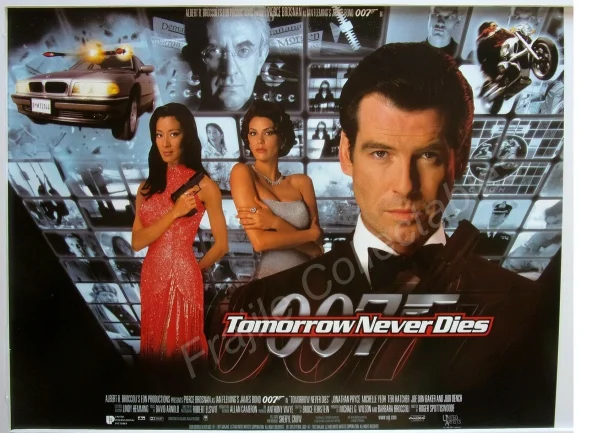
The James Bond franchise has had a complicated relationship with its female characters since its inception. While many espionage and action films from the classic age of cinema featured unfortunately reductive female characters, the male fantasy of 007 has been integrated within the saga’s mythology from the very beginning. The issues with the “Bond girls” become shockingly apparent within Roger Moore’s tenure as the character, prompting the franchise to attempt to modernize its gender dynamics within Pierce Brosnan’s run as 007. This led to some productive, but overall mixed results. Even today, folks throughout the industry continue pushing toward incorporating women more substantially into creating the James Bond franchise.
1995’s Goldeneye made a great decision in bringing in Judi Dench as Bond’s new boss, M; within her debut scene, she even calls out Bond’s sexism, calling him a “relic of the Cold War.” Unfortunately, the rest of Brosnan’s female counterparts weren’t as well spoken. Goldeneye’s Natalya Simonova (Izabella Scorupco) sacrifices her agency after being unable to resist 007’s charms, The World Is Not Enough features the laughably named nuclear physicist Christmas Jones (Denise Richards), and Halle Berry’s appearance as Jinx in Die Another Day felt like she was simply there to set up a spinoff project that never saw the light of day. However, the one exception to this trend is Michelle Yeoh’s extraordinary performance as Wai Lin in 1997’s Tomorrow Never Dies, which celebrates its 25th anniversary this year.
Mai Lin isn’t a helpless object of sexual fantasy that Bond seduces into betraying her own interests; she’s an independent espionage agent from the Chinese Ministry of State Security who has her own agenda and mission. Lin doesn’t turn to 007 out of helplessness, but because they have a shared enemy in the new media mogul Elliot Carver (Jonathan Pryce). Considering that Yeoh would go on to become one of the film industry’s top action stars with films like Crouching Tiger, Hidden Dragon and Everything Everywhere All At Once, it’s notable that her earlier career included co-starring in another franchise vehicle. While being a “Bond girl” is usually an embarrassment on many great actresses’ resumes, Yeoh actually improved the series and helped make Tomorrow Never Dies one of the most unique installments.
While Goldeneye returned to the “classical Bond” tone following the grittier approach of Timothy Dalton’s two films as the character, Tomorrow Never Dies at least tried to place Bond within a modern context. This is evident in the film’s main antagonist, who is a not-so-subtle parallel to Fox News’ Roger Ailes. It made sense that Bond would need the assistance of another international agent, so teaming him up with someone like Lin simply made sense. The film offers a nuanced take on their shared goals without trying to be too politically motivated.
Lin doesn’t enter the film until nearly midway through, and she immediately helps the pacing improve. The early part of the story focuses on some typical 007 misadventure; Bond is alerted to a crisis, gets scolded by his superiors, sleeps around, and tries out some gadgets. However, Lin’s arrival signifies that he needs to take his mission more seriously. The Chinese government knows that Carver could potentially set up World War III through his propaganda campaign, and neither Bond or Lin have time to question each other’s motives. Their early interactions are relatively respectful, as Bond thankfully keeps his seductive comments to himself.
It’s also just an extraordinary action sequence that offers Bond’s best underwater sequence since Thunderball. Lin and Bond are quickly captured and overwhelmed by Carver’s goons, forcing them to team up to free themselves. It’s Lin who sets up the stakes of the story, as she gives Bond insight on Carver’s plan to start World War III. Bond and Lin are on equal footing, because they know that they’d be enemies if Carver’s plan is successful.

Bond’s superiority complex has always made him a somewhat difficult character to relate to. Part of Bond’s initial appeal is that he’s simply the best at everything; while Sean Connery was able to make this cheeky and fun in his initial films, it became more and more irritating as the series continued. Instead of letting Bond show off his skills to a helpless novice, Tomorrow Never Dies gives him someone who is equally matched. Lin isn’t simply stunned whenever Bond drags her into an action sequence, and she doesn’t just marvel at all of the gadgets he has at his disposal.
It also helped that Yeoh was already an established action star in her own right. She had previously co-starred in a franchise vehicle when she appeared in Police Story 3: Super Cop, and she did a majority of her own stunt work in several other Chinese action films. Tomorrow Never Dies gave her a chance to introduce herself to international audiences; while early Bond films could be accused of xenophobia and racism, Tomorrow Never Dies actually pays respect to its Chinese characters and treats their culture with respect.
The equal pairing of the characters is best personified in Tomorrow Never Dies’ most creative action sequence, in which Bond and Lin are handcuffed together and forced to escape on a motorcycle. Bond has dragged many of his leading ladies into chases, but seeing these two assassins trade quips as they respond to the awkward scenario is far more entertaining. It’s a situation that brings out both of their senses of humor, as nothing in their training could have prepared them for something like this.
One of the common criticisms of the Bond franchise has been the lack of emotional depth; if Bond simply sleeps with his love interest and then never sees them again, why should we invest in any of his relationships? This has also attracted criticism for its assumptions about Bond’s disregard for his female love interests. However, the relationship with Lin is wrapped up in a sensitive manner in Tomorrow Never Dies. While they unite for an intimate moment at the end of the film, neither character seems to make any loving dedications of infatuation. They both seem to recognize that following their mission, they’ll return to their respective countries, and likely never see each other again.
This wasn’t the first or last time that the Bond franchise attempted to debut a female counterpart that was Bond’s equal, but it was easily the most successful. The Spy Who Loved Me’s XXX (Barbara Bach) becomes a little too infatuated with Bond, and Halle Berry’s Jinx simply felt at odds with the film’s tonal shifts. Comparatively, Yeoh strikes the right balance between humor, heart, and campiness that made the series so successful in the first place.
Tomorrow Never Dies deserves to be held in a higher regard by Bond fans. Its release was overshadowed by the box office success of Titanic, and it’s too often lumped in with the disastrous implausibility of The World is Not Enough and Die Another Day. Yeoh is integral to the film’s hip, modern take on the franchise; she took what could have been an empty role, and turned it into something far more dynamic and interesting.
[via]







